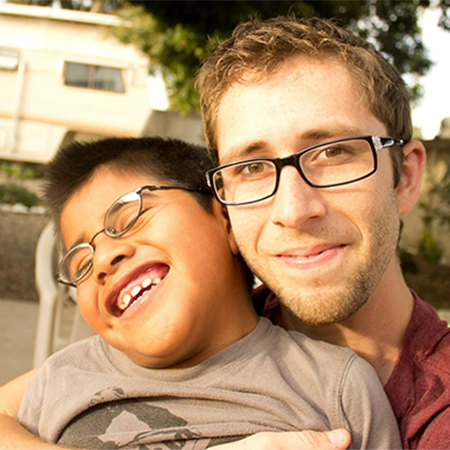
For many people living with or raising someone with a disability, suffering is an inevitability. Expensive medications and doctor consults, societal stigmas and discrimination, and physical discomfort and pain caused by chronic health conditions often characterize the lives of people with disabilities and their families. This suffering is intensified in high-poverty regions where medical services are inadequate and families are struggling to survive. So how should we respond? What can be done to support these community members who experience hardship that few truly understand?
Estefania was a student in our school. She was only 2 years old when she died last year. She had Down syndrome and feeding issues that prevented her from gaining weight. In the city, she would have received adequate care, but here, in rural Baja California, the doctors did not know how or did not have the resources to help her. Her physical fragility led to multiple bouts of pneumonia. Her body could not take the constant infections and eventually gave up. Her death came as a shock to her young parents. The local Catholic church hosted her funeral. As I listened to the priest’s message, something really stood out to me. He said that nobody in the room can possibly understand the pain and suffering of Estefania’s parents unless they have experienced something similar. What he was speaking about was solidarity. Behind the priest was a large crucifix, the ultimate icon of suffering and solidarity. In that moment I realized why the message of Christianity is unique in its ability to alleviate suffering. As Henri Nouwen and his associates share in their book, Compassion:
God came to share our lives in solidarity. It does not mean that God solves our problems, shows us the way out of our confusion, or offers answers for our many questions. God might do all of that, but the solidarity of God consists in the fact that God is willing to enter with us into our problems, confusions, and questions.

What people seek most in their grief is accompaniment. They want to know that they are not alone, that other people share in their sorrow and pain. This is the essence of Jesus’ ministry. It is about God willingly entering into human pain and suffering in order to fully understand and love the people God created. Maybe nobody in the church on the day of Estefania’s funeral could understand the depth of her parents’ grief. However, the image of the broken Jesus was a symbol of comfort, a reminder of the unconditional, sacrificial love of God. Jesus’ life and death model how Christians must live. If Christians are to live with integrity and authenticity, they must follow Jesus to the depths of human suffering, intentionally standing in solidarity with others in their pain. This is not a masochistic act, but rather a loving choice to share in the inevitable burdens of the people hurting around us. It is an action that can move church communities from inaccessibility to welcome, from ignorance to understanding, from exclusion to friendship, and from pity to solidarity. By standing at the borders of another’s suffering and solitude, Christians can effectively mediate the love of God to a person who needs something more than any human can give. We may never be able to rid ourselves of pain and suffering on this earth, but through genuine community and friendship, we can experience hope, companionship, and love amidst the tears.
What can we do to show love to those who are hurting the most? While it is impossible to take away someone else’s pain, we can willingly enter into another’s sorrow and be present when they feel most alone. We can sacrifice our comfort, time, and sense of strength to be vulnerable co-sufferers. It is critical to understand that what really matters is that in moments of pain and suffering, someone stays with us. More important than any particular words or actions is the humble presence of someone who cares. When this happens—the mere company of a loving, unpatronizing friend amidst unthinkable grief and pain—suffering is alleviated.

Austin Robinson (GIC 2017) is the Executive Director at Eternal Anchor, an organization founded in 2014 to offer quality disability services in the communities of rural Baja California, Mexico. Originally published on the Eternal Anchor website, this article has been used and adapted with permission. Learn more about Eternal Anchor at eternalanchor.org.